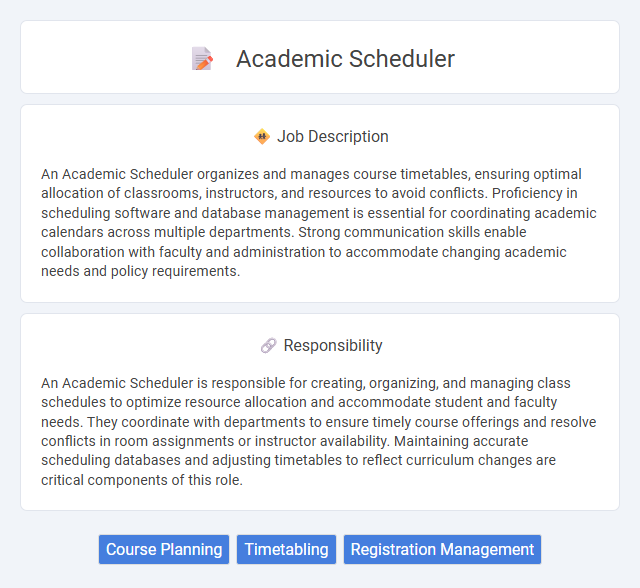
An Academic Scheduler organizes and manages course timetables, ensuring optimal allocation of classrooms, instructors, and resources to avoid conflicts. Proficiency in scheduling software and database management is essential for coordinating academic calendars across multiple departments. Strong communication skills enable collaboration with faculty and administration to accommodate changing academic needs and policy requirements.
Individuals who are detail-oriented and possess strong organizational skills are likely to be well-suited for an Academic Scheduler position, as the role involves managing complex schedules and coordinating multiple academic activities. Those who thrive in environments requiring high levels of accuracy and time management may find this job aligns with their strengths. Conversely, people who struggle with multitasking or prefer flexible, unstructured work might find the demands of this position challenging.
Qualification
An Academic Scheduler requires a strong background in educational administration and proficiency in scheduling software such as Banner or PeopleSoft. Candidates should possess excellent organizational skills, attention to detail, and the ability to manage complex academic calendars to optimize course offerings and room assignments. A bachelor's degree in education, business administration, or a related field is typically preferred, along with experience in academic planning or registrar services.
Responsibility
An Academic Scheduler is responsible for creating, organizing, and managing class schedules to optimize resource allocation and accommodate student and faculty needs. They coordinate with departments to ensure timely course offerings and resolve conflicts in room assignments or instructor availability. Maintaining accurate scheduling databases and adjusting timetables to reflect curriculum changes are critical components of this role.
Benefit
An Academic Scheduler is likely to benefit from enhanced organizational skills and a deeper understanding of academic program structures. This role probably offers opportunities to collaborate with faculty and staff, improving communication and teamwork abilities. It may also provide a sense of accomplishment through optimizing class schedules that improve student satisfaction and institutional efficiency.
Challenge
The Academic Scheduler likely faces the challenge of balancing conflicting course demands while optimizing resource allocation, which may require advanced problem-solving skills. Managing unforeseen changes in faculty availability or room assignments could complicate the scheduling process and necessitate adaptive strategies. The role probably demands meticulous attention to detail to minimize overlaps and ensure a smooth academic calendar, testing both organizational and communication abilities.
Career Advancement
Academic Scheduler roles offer strategic opportunities to develop expertise in educational planning and resource allocation. Mastery of scheduling software and stakeholder coordination enhances project management skills, positioning candidates for leadership in academic administration. Progression often leads to senior roles such as Scheduling Manager or Academic Affairs Coordinator, expanding influence on institutional efficiency and policy implementation.
Key Terms
Course Planning
Academic Scheduler plays a crucial role in course planning by organizing class schedules to optimize resource allocation and maximize student enrollment. This position involves analyzing enrollment data, coordinating with faculty, and adjusting timetables to prevent conflicts and ensure compliance with academic policies. Efficient course planning by an Academic Scheduler improves campus operations, supports curriculum delivery, and enhances the overall student experience.
Timetabling
Academic Scheduler roles prioritize timetabling to efficiently allocate courses, instructors, and classrooms while minimizing conflicts. Advanced software tools enable optimization of schedules based on student requirements, faculty availability, and room capacity constraints. Data-driven timetabling improves resource utilization and enhances student course access within academic institutions.
Registration Management
Academic schedulers streamline registration management by coordinating course availability, enrollment capacities, and student schedules to optimize class assignments. They utilize advanced scheduling software to track registration deadlines, resolve conflicts, and ensure compliance with institutional policies. Effective registration management by academic schedulers enhances student satisfaction and supports efficient resource allocation within educational institutions.
 kuljobs.com
kuljobs.com